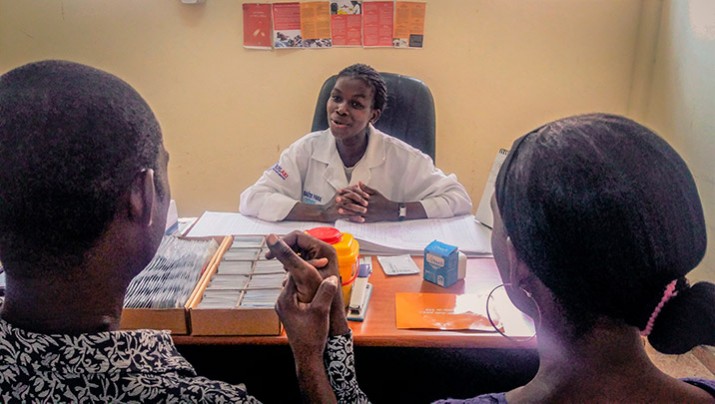Living Positively in Angola
Living Positively in Angola

Linking Mothers and Couples to HIV Testing and Care
Shortly after the birth of her second child, Manuela dos Santos learned that she was HIV positive. Fearing how her family and friends might react to her diagnosis, she kept her status a secret for weeks. Fortunately, her child was born HIV negative, but Manuela’s health quickly deteriorated. At just 25 years old, she was losing weight, sleep, and the ability to care for her newborn child.
Every year in Angola, an estimated 12,000 women aged 15 and over and 3,600 children under 14 years of age are newly infected with HIV. Lack of awareness and education about HIV leaves many unaware of their status. Those who learn they are infected will often face rejection or abandonment by their spouse and other family members. Infected women are especially vulnerable when their status becomes public.
Eventually, Manuela developed AIDS and her illness became impossible to hide. She broke down in tears to her sisters and brother-in-law, who, to her surprise, offered support and care. They accompanied her to Hospital Esperanza for treatment. The first few weeks on outpatient antiretroviral treatment were difficult, but she thought of her two children and persisted.
Today, 10 years later, Manuela shares her story with people who struggle to cope with an HIV positive diagnosis. After years of adherence to antiretroviral treatment, she has had an undetectable viral load for 6 years, and her partner remains HIV negative.
“I feel happy—and realized: sharing my story helps people cope with a positive diagnosis and get the treatment they deserve and need to fulfill their lives,” Manuela said. As a Patient Assistant Facilitator (PAF) trained under the USAID-funded Health For All (HFA) Project, she accompanies couples for HIV testing and provides counseling and support to people living with HIV. She helps them build the skills they need to cope with the illness and continue to lead productive lives.
The HFA Project trains and supports 16 PAFs like Manuela across seven health facilities in Luanda, which strengthens Angola’s capacity to deliver high-quality care and treatment for HIV and AIDS. The HIV & AIDS portfolio of HFA, led by Population Services International and implemented by MSH, is piloting a continuum of care model that will increase the number of people receiving testing, counseling, and treatment for HIV.
PAFs are part of the project’s innovative approach, which involves a team of advocates and educators who extend the reach of the health system into communities. Facilitators like Manuela help people stay on treatment and live positively, as well as identify new people living with HIV.
Thanks to the work of PAFs and their coordination with HFA-supported community counselors, Angola has begun to see a dramatic increase in the identification of HIV-positive individuals and in linking them to care and treatment—significant progress toward reaching the 90-90-90 goals. Between January and March 2018, PAFs contributed to the project’s success in reaching more than 17,700 people with HIV testing services; identifying more than 1,500 new HIV-positive cases; and initiating nearly 1,000 newly identified cases on antiretroviral treatment.
Happily expecting her third child, Manuela counsels pregnant women to protect their children from the virus by learning their status as early as possible and beginning treatment immediately if they test positive. Investment in training and support of Manuela and other PAFs is building an important support system for Angolans living with HIV.